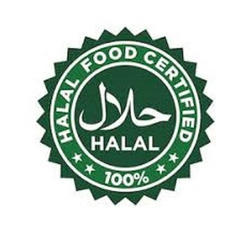The
term 'Halal' is an Arabic which literally
means 'lawful' or 'permissible'. In Islam, this term
refers to many aspects of daily life, but in relation
to the production of products such as food, drink,
pharmaceuticals and cosmetics, it refers to the composition
of the products and the environment in which they are
produced. The ingredients used must be judged to be
lawful according to the principles of Islamic law.
The most important principle relates to the slaughter
of meat. Briefly, for slaughter of an animal to be
considered 'Halal', the name of God must be invoked
before the slaughter is carried outIt must be done
with a sharp knife in one movement, severing the trachea,
oesophagus, both jugular veins and both carotid arteries.
The animal must then be allowed to bleed out completely.
Throughout the process, pain to the animal must be
minimised.
Benefits for producers:
- They can offer their products to the global Muslim
market, which constitutes approximately 1.6 billion
people (20% of the world's population) and described
as the most untapped market in the world.
- They can benefit from HAB's Worldwide Standard,
which has been devised by expert Islamic scholars
and leaders in the Halal production industry to
ensure it produces high quality products of Halal
integrity.
- They can benefit from the advice and expertise
of HAB and the Halal Authority Inspectors (HAI)
to ensure products are Halal.
- The HAB logo can be used on product packaging
and labels.
- The company's details will be added to our database
of Certified suppliers, which can be accessed by
consumers around the world.
Benefits for customers:
- There is peace of mind that the products they
are purchasing are Halal without having to review
the ingredients to decide whether they are suitable.
- HAB's Worldwide Standard gives reassurance to
Muslim consumers, wherever they are in the world.


